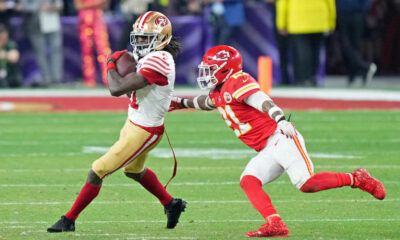The NFL has had 12 playoff games under the new overtime rules — 10 of them ended in the winner of the coin toss winning the game. The one game that didn’t have the coin toss winner win the game was the 2018 NFC Championship game between the Rams and Saints that ended in a controversial pass interference no-call. The other — Chiefs vs Bengals — we will talk about in the article, but the overtime rule has become very controversial, especially in playoff games.
The controversy is due to postseason games that are ultimately determined in OT — such as the 2022 Divisional Round Game between the Kansas City Chiefs and the Buffalo Bills that ended in a 42-36 win for the Chiefs.
In fact, this past weekend when the Chiefs won the coin toss before overtime, the crowd got so loud it sounded like they just won the game. That is how confident they were that the coin toss would decide the game:
The reason there is controversy over these games is that if the team that receives the ball first scores, then the game is over without letting the other team even touch the ball. This was seen in the Bills game when they did not get a chance to respond after Kansas City scored on the opening possession, ultimately ending the Bills season.
Since 1965, a total of 33 NFL playoff games have gone into overtime. Out of those 33, 20 of them had a result where both teams got an offensive possession. Although there has been a higher percentage of games where both teams got an offensive possession, the 13 games in which one team did not have a possession are shaping a potential change in the NFL’s overtime rules.
There is no clear resolution to this debate, but many people argue that inheriting the college football overtime rules would be the best in terms of fairness and entertainment.
The college OT rules are as follows: In each of the first two overtime periods, teams are granted one possession beginning at the opponent’s 25-yard line. Each team retains the ball until it scores, fails to score, fails to make a first down, or turns the ball over. Beginning with the second overtime period, teams must attempt a two-point conversion after scoring a touchdown. Beginning with the third overtime period, teams will begin to run alternating two-point conversion plays instead of entire offensive possessions.
If you’re a college football fan you’d understand that these overtime rules can lead to lengthy, but entertaining games. The College OT Rules do raise concern for some people though, as players would become more susceptible to injury due to the extended games.
As seen here, there are both positives and negatives to every idea that you could think of, but one thing is for sure, the NFL’s overtime rules and format will be a hot topic of discussion again in the league meetings this winter.
A source told The Sports Place that the NFL is expected to review its overtime rule this offseason.
Let us know what you think in the comments below! Should the NFL change their overtime rule?














